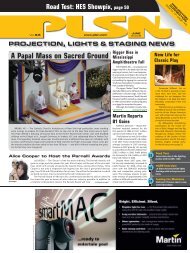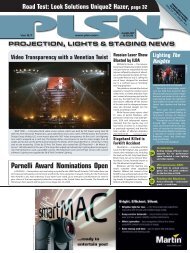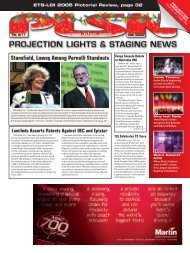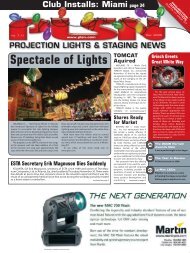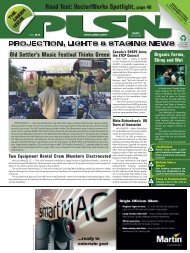September Issue - PLSN.com
September Issue - PLSN.com
September Issue - PLSN.com
Create successful ePaper yourself
Turn your PDF publications into a flip-book with our unique Google optimized e-Paper software.
Ad info: www.plsn.<strong>com</strong>/rsc<br />
came to them: Michael Crawford’s EFX. Harris<br />
took on the role of executive producer<br />
for this show.<br />
“That job was unique because each scene<br />
was the equivalent of one entire Broadway<br />
musical, and it really stretched the capability<br />
of the <strong>com</strong>pany. It was quite a special time. We<br />
grew up.” They had to—the proscenium was<br />
110 feet wide and there were 200 High End<br />
Systems Cyberlights and 300 Vari*Lites being<br />
used.<br />
Reflecting on the go-go 1990s, Harris says<br />
what was previously a craft industry with<br />
some technical aspects like hydraulics, etc.,<br />
suddenly became highly technology-driven.<br />
He points out that the Jules Fisher’s original<br />
Chicago had 220 fixtures and eight winches,<br />
making it an extraordinarily <strong>com</strong>plicated<br />
show for its day. But if that show was produced<br />
today, there would be 1500 lights and<br />
50 winches.<br />
The next discipline for Harris to tackle was<br />
theme parks.<br />
“We pursued that theme park market because<br />
it was another place to apply our craft,”<br />
he says. “All these transitions were learning<br />
experiences for the positive. They might not<br />
have always been financial successes, but<br />
many of the forays out of theatre were not initially<br />
financially successful. But it’s almost like<br />
traveling abroad in terms of experience and<br />
growth. There’s a certain magic in each area<br />
of the market that we participate in. And the<br />
theme park industry was totally different.”<br />
The theme park market door swung open<br />
because of two big non-traditional shows he<br />
worked on: Beauty and the Beast, where he<br />
was production supervisor, and EFX. These<br />
two experiences gave him a new perspective<br />
on the world because<br />
the <strong>com</strong>panies that<br />
put on these shows,<br />
Disney and MGM,<br />
had something most<br />
Broadway shows are<br />
lacking: resources.<br />
He marvels how<br />
he was working with a<br />
<strong>com</strong>pany that pulled<br />
together $1.5 billion for<br />
a hotel. “I’m just a guy from Broadway where<br />
you have to scrape, borrow, beg and steal to<br />
get a show produced!” he laughs. “MGM and<br />
Disney taught me there were other ways to<br />
do what we do.”<br />
This continued growth in all areas allowed<br />
him to found Production Resource Group<br />
(PRG) in 1996, and the other <strong>com</strong>panies were<br />
placed under that. There was a bit of a buying<br />
spree in the following years, and leading<br />
lighting and audio <strong>com</strong>panies were brought<br />
into the fold, including Production Arts, Vanco,<br />
Bash, Cinema Services, Promix, Electrotec,<br />
Lighting Technologies, A-1 Audio, Production<br />
Lighting Systems, Light & Sound Design, Four<br />
Star and Westsun.<br />
Soon PRG had 16 offices in the U.S., Canada,<br />
UK and Japan.<br />
He says that he noticed a phenomenon in<br />
the 1990s where the industry’s entrepreneurs<br />
of yesteryear were at the point of getting out<br />
of the business, and they were either handing<br />
it down to their kids with decidedly mixed results<br />
or just closing the doors. PRG filled that<br />
gap and quickly became the 800-pound gorilla.<br />
And Harris is not apologetic about it.<br />
“There was a lot of criticism and angst<br />
about this big monster called PRG, but at the<br />
end of the day I think we were a necessary<br />
‘evil’ because we allowed certain people to realize<br />
all the equity in their business over their<br />
lifetime,” he says. “So it was unique in the ‘90s,<br />
and I saw an opportunity to grow our business.<br />
They say if you don’t continue to grow,<br />
you die.” He saw a growing need for more<br />
integration of everything, more turnkey operations,<br />
and a move away from the a la carte<br />
approach.<br />
“I think for a<br />
long time people<br />
will still buy things<br />
individually, but in<br />
some areas there<br />
will be more integration<br />
in what<br />
we do and how<br />
we do it.”<br />
“Still a Lot to Do”<br />
While flattered at the Parnelli, the youngest<br />
recipient of our industry’s most prestigious<br />
award is a little un<strong>com</strong>fortable with it.<br />
“I’m still a young man, and there’s still a lot to<br />
do,” he laughs.<br />
With 1500 people working with him<br />
worldwide, he notes how far he’s <strong>com</strong>e. A<br />
single issuing of paychecks is more than what<br />
the <strong>com</strong>pany used to make in a year.<br />
Understandably, the personal challenge<br />
is keeping it fun. On the morning of the interview<br />
for this article he had just been to<br />
a meeting of a new Broadway show, and he<br />
says that part, the production side of theatre<br />
or a corporate event or a concert “is something<br />
I actually don’t get enough of.” Otherwise,<br />
he’s trying to drive the Queen Marysized<br />
ship, making the right decisions about<br />
the future and keeping pace with the everchanging<br />
market. The modest Harris does allow<br />
himself one bragging point:<br />
“One of the things I do is work for the<br />
people at this <strong>com</strong>pany. This is bold, but the<br />
best people in the industry are with us. We<br />
still have all the original inventors of Vari-Lite<br />
and Stage Command, and just have a wealth<br />
of knowledge here that is second to none.”<br />
That indulgence aside, he’s not that interested<br />
in reflecting on the history of the business,<br />
and you won’t hear a moan about how<br />
things were “better” in the “good old days.”<br />
“A lot of people would say no, things<br />
aren’t as good as they were in this business,”<br />
he shrugs. “But I say the world is about<br />
change. We change everyday—emotionally,<br />
spiritually. I think what happens to the entire<br />
industry enhances the experience in certain<br />
ways that are all for the positive. Like the<br />
original Chicago. I don’t know if more recent<br />
productions are better or worse—just different.<br />
Live entertainment continually reinvents<br />
itself. And I think audiences overall are more<br />
entertained today.”<br />
Few who know and worked<br />
with him are surprised at<br />
his success.<br />
“I always thought he had very special<br />
quality,” Cohen says, on the phone . He was<br />
always wonderful with people, and has a very<br />
even keel as far as ego is concerned. And he<br />
seems to understand highly <strong>com</strong>plex business<br />
situations and technical situations, and<br />
has been able to mold those together—thus<br />
you have PRG today, which was built mostly<br />
on his back. He had some difficult moments<br />
too, of course. But he’s resilient, an extremely<br />
hard worker with a high degree of integrity<br />
and a God-given talent.”<br />
Harris will receive the Parnelli Lifetime<br />
Achievement Award on October 20, 2006,<br />
at the Venetian Resort-Hotel-Casino in Las<br />
Vegas during LDI. Past honorees include<br />
Patrick Stansfield, Bob See, Chip Monck,<br />
Mike Brown and Brian Croft. For more information<br />
and to make reservations, go to<br />
www.parnelliawards.<strong>com</strong>.<br />
Jere with his father Joe Sr.<br />
32 <strong>PLSN</strong> SEPTEMBER 2006<br />
www.<strong>PLSN</strong>.<strong>com</strong>



